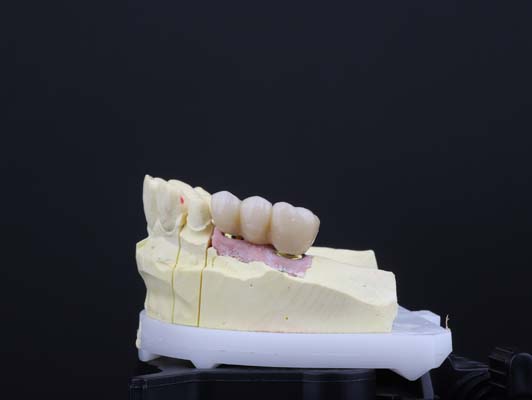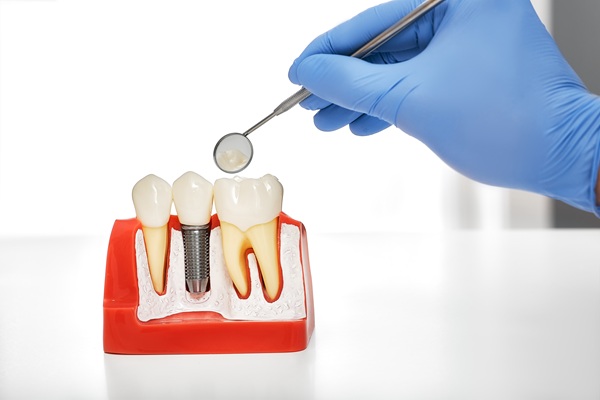How a Dental Bridge Is Held in Place

A dental bridge is an oral prosthetic that closes the space left by multiple missing teeth. It has two main components: artificial teeth called pontics and crowns (abutments) placed on the two teeth closest to the space on both sides. The artificial teeth can be made from various materials like gold, silver, and other metals, but porcelain pontics are the most popular since they look just like natural teeth.
Anchoring down a dental bridge
The type of dental bridge being installed in the patient’s mouth often dictates how the dentist goes about anchoring it down. Let us take a look at the four main types of dental bridges used in dentistry:
1. Conventional dental bridge
Traditional dental bridges are anchored down on the two teeth closest to the gap left by missing teeth. Crowns are usually placed on these teeth to strengthen them so they can provide more stability for the bridge. Preparing the abutments from crowns requires taking off enamel from their sides. That permanently leaves them altered, so they will always need a restoration to serve as their artificial enamel.
2. Cantilever dental bridge
Cantilever bridges are similar to traditional bridges, but there is one significant difference; the pontics are anchored down to only one abutment. These types of bridges are typically recommended when there is only one tooth next to the space left by lost teeth.
3. Maryland dental bridge
These also use two abutments like traditional bridges, but it does not require placing crowns on the teeth closest to the gap. Maryland bridges use a porcelain or metal framework bonded to the backside of the two teeth closest to the gap.
4. Implant-supported dental bridge
Implant-supported bridges might be recommended for patients who want a complete missing teeth solution. Implants are metal rods that serve as artificial teeth roots, and they help prevent the bone tissue loss that takes place when a tooth is lost.
Implants also happen to be one of the pricier ways to replace missing teeth, so dentists often recommend combining them with other restorations to reduce costs. That way, the patient still gets the bone preserving properties of implants while saving a considerable about of money. To keep things in perspective, the price of a single implant is typically more than the cost of a full set of dentures.
Implant-supported bridges involve inserting implants at the two ends of the space left by missing teeth and placing crowns on them. These crowns then serve as abutments that hold pontics that replace the rest of their missing teeth in place.
Benefits
Some of the benefits of replacing missing teeth with dental bridges include:
- Improves the patient’s smile
- Restores speech
- Improves chewing ability
- Helps to preserve the shape of the patient’s teeth
- Prevents the patient’s remaining teeth from moving out of their proper alignment
Replace your missing teeth
A dental bridge is one of the options you should consider if you have missing teeth. Give us a call or visit our Babylon clinic to set up an appointment with our dentist.
Request an appointment here: https://babylonsmiles.com or call Edward Zeva D.M.D. at (631) 773-1094 for an appointment in our Babylon office.
Check out what others are saying about our dental services on Yelp: Dental Bridges in Babylon, NY.
Recent Posts
A dental bridge is a valuable solution for individuals with missing teeth, providing functional and aesthetic benefits. If you are considering dental bridges to restore your smile, you will need to determine whether you are a suitable candidate for this treatment.Let us discuss the factors that determine whether a patient is a suitable candidate for…
Think you may need a dental crown? Read on to learn more about this dental restoration. Teeth are the strongest part of our bodies; however, they are also easily harmed by day-to-day activities like drinking and eating. When teeth are damaged or decayed, dental crowns serve as caps or covers to restore their shape, strength,…
Dental crowns are used in general dentistry very frequently as they are quite versatile. They can solve a number of problems ranging from a simple chip to a severe break. When considering dental restorations, it is worth looking into dental crowns. Outside of being versatile, they are offered in different materials, which can be helpful…
Metal free crowns offer significant advantages over traditional metal crowns. Metal has long been the standard material used for crowns in dentistry for quite some time. It has provided an effective and efficient method for protecting damaged teeth while preserving a patient’s ability to chew. However, as technology continues to advance, metal-free crowns are now…


